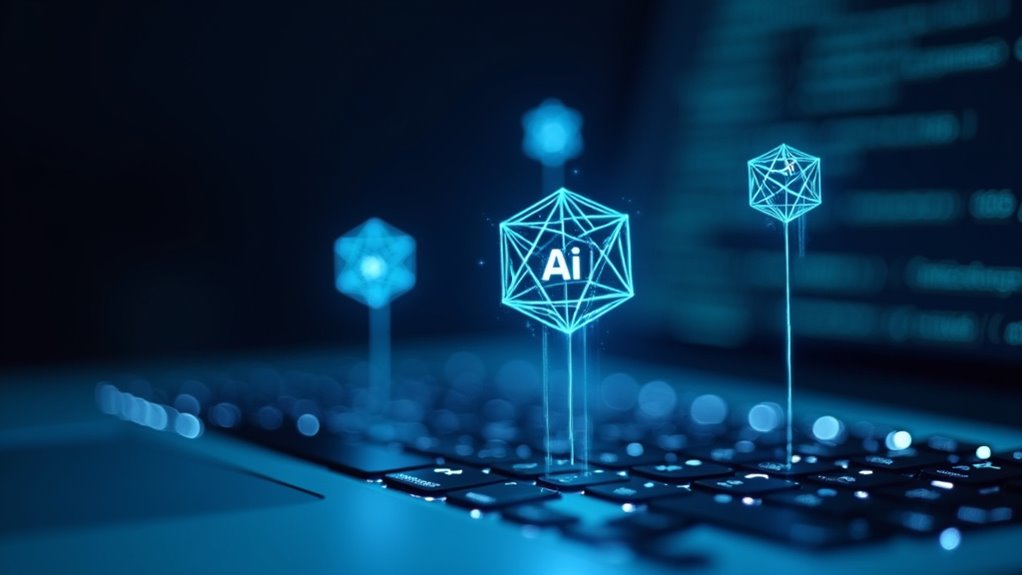Beginners should start their AI journey with Python programming basics and fundamental statistics. Free courses like elementsofai.com offer entry points without complex math barriers. Choose a structured path through Coursera’s “AI for Everyone” or interactive platforms like DataCamp. Don’t try to master everything at once—pick one specialty like machine learning or computer vision after learning basics. Consistent practice trumps perfection, and practical projects cement theoretical knowledge. The six-month to two-year investment will reveal a field where professionals earn six-figure salaries.

While artificial intelligence might seem like an impenetrable fortress of complex mathematics and coding wizardry, breaking into this field is more accessible than ever before. The journey starts with building foundational knowledge in statistics, basic mathematics, and programming—particularly Python, the undisputed champion of AI programming languages. Think of these skills as your toolbox; you can’t build a house without hammers and nails, can you?
Numerous AI resources exist specifically designed for newcomers, with platforms like elementsofai.com offering free courses that mercifully skip the complex math typically associated with the field.
Learning strategies matter enormously when tackling such a vast discipline. Some learners thrive in structured environments like Coursera’s “AI for Everyone,” while others prefer the hands-on approach of DataCamp’s interactive courses. The time investment varies significantly, taking approximately six months to master the fundamentals and up to two years for advanced skills. Following a thoughtfully designed learning roadmap can help you progress from basic AI concepts to more complex topics like neural networks in a logical sequence. Don’t overthink it! Pick one approach and stick with it long enough to see results.
Remember: consistency trumps perfection every time.
The field branches into several specializations—machine learning, deep learning, natural language processing, computer vision, and robotics. Newcomers shouldn’t try to master everything at once. That’s like attempting to eat an entire thanksgiving turkey in one bite. Choose one area that genuinely interests you and dive deep.
Career aspirations should guide your learning path. Research roles typically demand advanced degrees and theoretical mastery, while applied positions value practical implementation skills. Data scientists, machine learning engineers, and AI developers represent just a few potential career destinations. With an impressive median salary of $136,620 annually in the U.S., AI engineers enjoy strong compensation for their specialized skills.
Practical projects remain essential regardless of your chosen path. Theory without application is like knowing cake ingredients without ever baking—pointless and unsatisfying. Start small with guided projects before tackling independent work.
Communities like Stack Overflow and GitHub can provide feedback when you inevitably hit roadblocks.
The AI learning journey isn’t a sprint but a marathon. With determination and the right resources, anyone can shift from curious beginner to capable practitioner. The most important step? Starting today.
Frequently Asked Questions
Do I Need a Computer Science Degree to Learn AI?
No, a computer science degree isn’t mandatory for AI learning. Many professionals navigate alternative education paths through online courses, bootcamps, or self-study.
While CS fundamentals provide a solid foundation, determined learners can acquire specific AI skills without the formal degree.
AI career paths are increasingly diverse, welcoming those with backgrounds in mathematics, statistics, or even unrelated fields who’ve mastered the necessary technical concepts.
What matters most? Commitment to learning and practical application, not the credential hanging on your wall.
How Long Does It Take to Become Proficient in AI?
Becoming AI-proficient isn’t a sprint, folks. Time commitment varies wildly based on learning pace and goals.
Most beginners need 6-12 months of consistent study to grasp fundamentals, while mastery takes years.
Want to speed things up? Dedicate daily practice time, focus on practical projects, and join AI communities.
Remember, it’s not just about cramming knowledge—it’s about applying it. Even “experts” constantly learn new techniques.
The AI field waits for no one!
Which Programming Language Is Best for AI Beginners?
Python stands out as the top choice for AI beginners. Its readable syntax and extensive libraries (TensorFlow, PyTorch) offer incredible Python advantages for quick model development.
While Java has enterprise applications, its Java limitations include verbose syntax and steeper learning curve—not ideal when you’re just starting out.
Python’s massive community means you’ll never get stuck without help. Want to jump into AI without unnecessary headaches? Python’s your ticket.
Libraries, readability, community support—what’s not to love?
Can I Learn AI With Limited Mathematical Background?
Yes, you can learn AI with limited mathematical background, but you’ll need to tackle math fundamentals eventually.
Start with beginner-friendly platforms that abstract complex math while gradually building your foundation.
Smart learning strategies include focusing on practical applications first, then circling back to understand the underlying theory.
Remember, you don’t need to become a math genius overnight—many successful AI practitioners built their mathematical muscles incrementally, one concept at a time.
Just start somewhere!
Are Free Online Resources Enough to Master AI?
Free online resources provide an excellent starting point for AI learning, but mastery requires more.
Online courses offer foundational knowledge, while practical projects turn theory into skill. Community forums connect beginners with experts who’ve “been there, done that.”
Self-paced learning works well for basics, but advanced AI concepts may require structured education. The free stuff gets you started—think of it as training wheels—but real mastery demands a combination of resources, dedication, and eventually specialized learning.
You can’t build a house with just a hammer.









